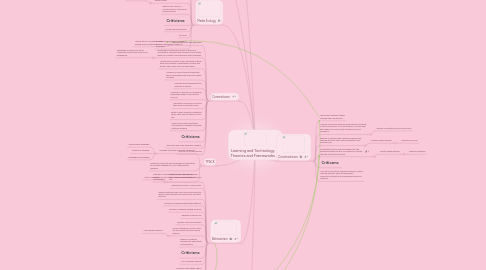
1. Cognitivism
1.1. Response to Behaviourism
1.2. Believes that the mind is more than a "blank slate"
1.3. Memory systems are very active and are very organized processors of information which is contrary to what was thought before
1.4. Prior Knowledge is key in learning
1.5. The mind is like a computer; there are always connections being made
1.5.1. Schema and scaffolding allow us to make connections
1.6. Brain is a very active network : it has sensory memory, long term memory and working memory.
1.6.1. Working memory has replaced short term memory and working memory can be overloaded or underloaded.
1.7. Meaningful effect
1.7.1. If connections are being built between what students are learning and things going on their lives or interests than learning can become meaningful. So students want to learn because they feel a connection and the information now has meaning to them
1.8. Motivation
1.8.1. How the students build the schema's
1.9. Practice for retention
1.10. organization
1.10.1. things like prezi's or notebooks
1.10.2. mneumonic
1.10.2.1. These are memory devices such as : Never eat soggy wieners! This helps remember which way north, east, south and west are.
1.11. Criticisms
1.12. Ignores affective and psycho-motor
1.13. to focoused on knowledge; difficult to measure understandings and higher order thinking skills
2. Behaviorism
2.1. Practice makes perfect ideology; the more you practice the better you get.
2.1.1. Lots of repetition
2.2. Believes the mind is a "Blank slate"
2.3. Believes that learning comes from environmental; believes that learning is an response to any given stimulus.
2.4. Believes in modelling appropriate behavior
2.5. Believes in shaping; guiding students
2.6. Believes in giving cues
2.7. Believes in drill and practice
2.8. Mode of teaching is lecture style; not very active but very passive learning.
2.8.1. Very teacher directed
2.9. Believes in rewards, punishments and having consequences.
2.10. Criticisms
2.11. Over simplifies learning
2.12. Learning is not always tied to rewards or behaviours
2.13. Mind is not a blank slate
2.14. People accept new information and change oopinions depending on what they learn or know.
3. Connectivism
3.1. Learning theory for the digital age
3.1.1. Having lots of connections and making more connections.
3.2. knowledge is distributed across a network of connections, therefore that learning consist of the ability to construct and transverse those networks.
3.2.1. Knowledge is literally the set of connections formed by actions and experiences.
3.3. Forget about trying to know everything: instead build your network of knowledge, sources and access them when ever you need them.
3.4. Currency is one of the most important things: information has to be up to date/ accurate.
3.5. Learning and knowledge rest in diversity of options
3.6. Learning is a process of connecting specialized nodes of information sources
3.7. Capacity to know more is critical then what is currently known.
3.8. ability to see connections between fields, ideas and concepts is a core skill.
3.9. Never turning and maintaining connections is needed to facilitate continual learning.
3.10. Criticisms
3.11. How Does one really become an expert?
3.12. Informal vs formal learning
4. Media Ecology
4.1. study of media as an environment
4.1.1. media is not an organization but an environment
4.2. Affects human perception, feelings, values and outlooks
4.3. the idea that technology and communication play a leading role in human affairs
4.3.1. Media is a way of life
4.4. media is not a form of communication; it becomes communication
4.5. Criticisms
4.6. not one single definition
4.7. to broad
4.8. no coherent framework in which to organize the subject matter or questions
5. Social Construction of Technology
5.1. Technology does not determine human activity but human action shapes technology.
5.2. Technology can not be understood without understanding how that is embedded in it's social context.
5.3. acceptance or rejection of technology is determined by the social world
5.4. It is not only a theory but also has a methadology
5.5. Criticisms
5.6. there are many different interpretations
6. Philosophy of Technology
6.1. Similar to a statement of philosophy or a School mission statement but from the teachers point of view but on their philosophy of Technology
6.2. It can be written down in point format or even laid out like a one page essay format. The written statement usually reflects the teachers beliefs and values about technology.
6.2.1. Allows parents to also see what values and beliefs the teacher holds in regard to the education their child will be receiving in that classroom; as well as what technologies will be used.
6.3. It is great at getting new teachers or students to see what values or beliefs about technology are important to them.
6.4. Teachers can build a growth plan about how they intend to use technology as a teaching tool.
7. TPACK
7.1. Is broken into three important categories
7.1.1. Technological knowlege
7.1.2. Content Knowledge
7.1.3. Pedagogical Knowledge
7.2. relating to more than one knowledge; knowing how to use them together so it can support good teaching
7.3. attempts to identify the nature of knowledge received by teachers for technology integration into teaching.
8. Constructivism
8.1. Works like a network; always building new connections
8.2. It works by actively interacting with the surroundings in the environment. It can be physical, it can be with the people you meet or the situations you find yourself in
8.2.1. Teacher is facilitator and you do the rest
8.3. Believes in starting with complex problems and learning the basic skills while solving the more complex one.
8.3.1. Problem based learning
8.3.1.1. Learning as you go
8.4. Constructing one's own knowledge from the experiences that one has. Also believes in Active learning not passive learning.
8.4.1. Project based learning
8.4.1.1. tasks are authentic
